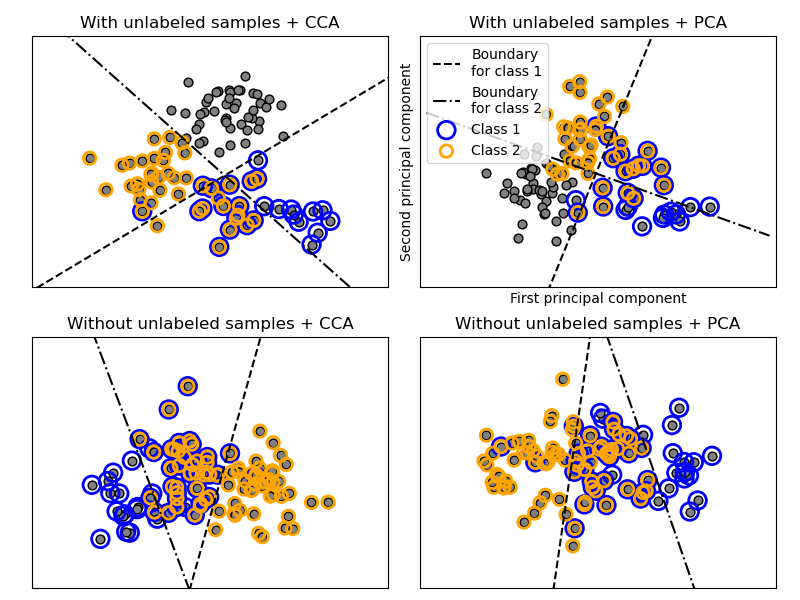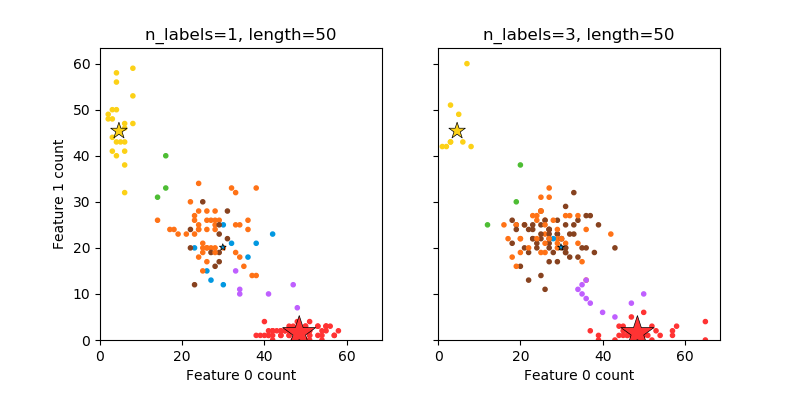sklearn.datasets.make_multilabel_classification?
sklearn.datasets.make_multilabel_classification(n_samples=100, n_features=20, *, n_classes=5, n_labels=2, length=50, allow_unlabeled=True, sparse=False, return_indicator='dense', return_distributions=False, random_state=None)
生成隨機的多標簽分類問題。
對于每個樣本,生成過程為:
選擇標簽數:n?Poisson(n_labels) n次,選擇一個類c:c?多項式(theta) 選擇文檔長度:k?泊松(長度) k次,選擇一個單詞:w?多項式(theta_c)
在上述過程中,使用拒絕采樣來確保n永遠不為零或大于n_classes,并且文檔長度永遠不為零。同樣,我們拒絕已經選擇的類。
在用戶指南中閱讀更多內容。
| 參數 | 說明 |
|---|---|
| n_samples | nt, optional (default=100) 樣本數。 |
| n_features | int, optional (default=20) 功能總數。 |
| n_classes | int,可選(默認值= 5) 分類問題的類數。 |
| n_labels | int, optional (default=2) 每個實例的平均標簽數。更準確地說,每個樣本的標簽數是從泊松分布中以n_labels作為其期望值得出的,但是樣本受n_class限制(使用拒絕采樣),并且如果allow_unlabeled為False,則該值必須為非零。 |
| length | int, optional (default=50) 特征的總和(如果是文檔,則為單詞數)是從具有此期望值的泊松分布中得出的。 |
| allow_unlabeled | bool, optional (default=True) 如果為True,則某些實例可能不屬于任何類。 |
| sparse | bool, optional (default=False) 如果為True,則返回一個稀疏特征矩陣 0.17版中的新功能:允許稀疏輸出的參數。 |
| return_indicator | ‘dense’ (default),‘sparse’,False 如果為dense,則以密集二進制指示符格式返回Y。 如果為'sparse',則以稀疏二進制指示符格式返回Y。 False返回標簽列表的列表。 |
| return_distributions | bool, optional (default=False) 如果為True,則返回給定類別的特征的先驗類別概率和條件概率,并從中得出數據。 |
| random_state | int, RandomState instance, default=None 確定用于生成數據集的隨機數生成。 為多個函數調用傳遞可重復輸出的int值。 請參閱詞匯表。 |
| 返回值 | 說明 |
|---|---|
| X | array of shape [n_samples, n_features] 生成的樣本。 |
| Y | array or sparse CSR matrix of shape [n_samples, n_classes] 標簽集。 |
| p_c | array, shape [n_classes] 繪制每個類的概率。僅在return_distributions = True時返回。 |
| p_w_c | array, shape [n_features, n_classes] 給每個類別繪制每個要素的概率。僅在return_distributions = True時返回。 |


